The Brookings Institution will host an event titled “Economic disruption, political upheaval, and social strife in the 21st century” on October 17 at 2:00pm. Register to attend the event in person or watch the live webcast here.
Large-scale change is transforming the world. Many of the beliefs and institutions that used to anchor international and domestic affairs have grown weak. Political and economic tidal waves have crashed in many parts of the world. We live in a technological era where new developments take place on a seemingly regular basis.
In my Brookings Institution book Megachange, I discuss dramatic shifts in technology, society, politics, and economics. Among the recent ones include the fall of communism, the Great Recession, the rise of ISIS, Trumpism, and Brexit, among others. Each of these megachanges went well beyond the small-scale, incremental shifts that have typified many societal developments.
In looking to the future, there are five megachanges with the potential to transform society and politics. They include robots or other forms of artificial intelligence taking jobs on a widespread scale; the discovery of primitive life elsewhere in the universe, raising existential questions for humanity; rising seas flooding low-lying coastal areas; far-right forces taking power in parts of Europe and elsewhere, and damaging democracy; and Iran developing a nuclear weapon. Any one of these developments would represent a startling change in the status quo and create major challenges for global leaders.
Robots take the jobs
According to an RBC Global Asset Management study, the costs of robots and automation technology have fallen substantially. Its report notes that the “high costs of industrial robots restricted their use to a few high-wage industries like the auto industry. However, in recent years, the average costs of robots have fallen, and in a number of key industries in Asia, the cost of robots and the unit costs of low-wage labor are converging. . . . Robots now are a viable alternative to labor and are able to perform a wide range of sophisticated functions.”
The rapid increase in emerging technologies could have a tremendous impact on the contemporary workforce. According to economist Andrew McAfee, “We are facing a time when machines will replace people for most of the jobs in the current economy, and I believe it will come not in the crazy distant future.” Technology already is substituting for labor, and the prospect of robots assuming even more responsibility in the workplace has dramatic consequences for the middle class.
In their highly acclaimed book, The Second Machine Age: Work, Progress, and Prosperity in a Time of Brilliant Technologies, economists Erik Brynjolfsson and Andrew McAfee argue that technology already is producing major changes in the workforce. The authors say:
“Technological progress is going to leave behind some people, perhaps even a lot of people, as it races ahead. As we’ll demonstrate, there’s never been a better time to be a worker with special skills or the right education because these people can use technology to create and capture value. However, there’s never been a worse time to be a worker with only ‘ordinary’ skills and abilities to offer, because computers, robots, and other digital technologies are acquiring these skills and abilities at an extraordinary rate.”
Even more dramatic is Oxford University research that claims technology will transform many sectors of life. Carl Frey and Michael Osborn studied over 700 occupational groupings and examined the odds of computerization in each field over the next few decades. Their results indicate that “47 percent of U.S. workers have a high probability of seeing their jobs automated over the next 20 years.”
If current trends continue, robots could transform the workforce and affect the possibilities for meaningful employment. The transformation of the economy is likely to alter the manner in which social benefits are delivered. Right now, much of healthcare and pensions are paid for through jobs. People gain credits for retirement by being gainfully employed. However, if a significant part of the future population does not have jobs, society will have to figure out other ways of providing healthcare and making people eligible for a basic income. Failure to do so will mean that these pockets of the unemployed could form the basis for social or political unrest.
Life is abundant around the universe
Not all threats are political or environmental in nature. Some raise existential questions for human beings themselves. With recent advances in space exploration and scientific knowledge, there is a growing belief among astrophysicists, astronomers, and biologists that microbial life is not limited to planet Earth, and that some forms of life are abundant around the universe.
Outside of our solar system, water, heat, and organic chemicals are plentiful. “Astronomers see the signature of water in giant molecular clouds between the stars, in disks of material that represent newborn planetary systems, and in the atmospheres of giant planets orbiting other stars,” according to a NASA scientist. Its component elements (hydrogen and oxygen) are very common and have been found on many different kinds of objects around the galaxy, including planets, moons, asteroids, meteorites, comets, and space dust.
In our own solar system, scientists have found water and heat sources in many places. Several moons, asteroids, and comets have water as well as basic molecules. These elements constitute life’s building blocks so it is quite plausible to consider the possibility of life beyond our globe. Europa, for example, is thought to have a liquid ocean beneath its ice, as does Saturn’s Enceladus. Orbiters have spotted water geysers coming from that moon, and scientists who have studied imaging data have concluded that it “has a huge global ocean below its ice-encrusted surface.”
For these reasons, leading scientists believe humans are close to being able to document that the conditions for life exist in many places around the universe. For example, Ellen Stofan, NASA’s chief scientist, says that “we are going to have strong indications of life beyond Earth in the next decade and definitive evidence in the next 10 to 20 years.” Continuing, she noted that “we are not talking about little green men. We are talking about little microbes.”
If people on Earth learn that life does exist elsewhere, it will force a dramatic shift in the “Earth-centered” thinking that has dominated human history and remains common today. The news will broaden people’s horizons about the nature of the universe, the abundance of life, and the role of religion in human thinking. That discovery would be transformative in terms of how humans see themselves and the worlds around them.
Rising seas flood the coasts
Almost all leading scientists believe that global warming is real and will lead to more frequent and severe storms, alterations in climate patterns across much of the globe, and higher ocean levels as a result of warming water and the melting of ice sheets on Antarctica and Greenland. Sea levels will rise at different rates around the world, but most forecasts suggest that water could rise above current levels by one to four feet by 2100.
In recent decades, many people have moved to coastal regions to enjoy the water or be closer to major cities. Some 600 million people around the world reside in poor areas that experience periodic flooding. In the United States, climate experts claim that “40% of the population lives in relatively high population-density coastal areas, where sea level plays a role in flooding, shoreline erosion, and hazards from storms.”
Areas at risk include some of the globe’s most prominent cities: New York City; Boston; Washington, D.C.; San Francisco; Los Angeles; Miami; Madrid; Amsterdam; Venice; Cape Town; Tokyo; Shanghai; Hong Kong; and St. Petersburg, Russia, among others. All of these cities are located on low-lying waterfronts, so a significant increase in sea levels could put parts of them underwater. A 2016 study estimated that it would cost around $14 trillion to relocate the millions of people in the United States displaced by rising seas.
There likely would be serious consequences for international politics arising from climate change. Economic deprivation and social unrest often lead to war, refugees, and societal conflict. Nations that lose territory or cropland because of rising seas, sustained drought, and other climate change factors may become more aggressive in dealing with their neighbors. They may seek new territory for their people or areas that can grow food. The prospect of “climate change refugees” already has raised widespread concern because people may have to flee home environments made hostile by higher temperatures, worsening storms, or sea-level rise. This would accelerate mass population migrations at a time when there is little acceptance of refugees crossing national borders.
Europe turns right and undermines democracy
Throughout the post–World War II period, most European nations followed the path of social welfare liberalism that provided generous government benefits and encouraged the notion of “Europe” as a united and democratic entity.
However, concerns about terrorism and refugee migration in Europe have shifted the political environment in some of these nations much further to the right. The flood of migrants from North Africa and the Middle East has sparked a major backlash in several countries and altered national policies. For example, the Netherlands and Norway already have elected governments with strong anti-immigration agendas. In Poland, anti-immigration parties have risen in power even though that country has accepted relatively few refugees.
Germany has witnessed growing popularity by the anti-immigration party known as the Alternative for Germany (AfD). In 2016 it gained representation in three state legislatures after polling between 13 and 24 percent in elections. Following the 2015 Paris terrorism attacks, the nativist National Front party in France made major gains in the first round of regional elections, although it did less well in the final elections. Even Sweden, often considered one of the most liberal and open societies in the world, has imposed new border controls on those entering from Denmark. They must have appropriate travel documents and citizenship status in order to come into that nation.
Amidst these developments, there are signs of intolerance and antidemocratic moves in places that have had functioning democracies. Turkey has seen its government led by President Recep Tayyip Erdogan shed its democratic leanings and consolidate power in the executive branch. He has used his leadership of the ruling Justice and Development Party to oust his prime minister, boost his authority over government, and weaken civic institutions. Following a 2016 coup attempt, his agents arrested tens of thousands of academics and government officials, and removed them from their positions.
Even the United States has not been exempt from a resurgence of nativist, anti-immigrant rhetoric. Republican presidential nominee Donald Trump has promised to “build a Mexican-funded wall across the continent, expel 11 million undocumented immigrants, blow up the global trading order, send Syrian refugees back into a war zone, ban the immigration of Muslims to the United States and consider a Muslim registry.” Some of his supporters cite these stances as the “politics of the middle finger” in which some voters are anxious to overturn existing policies and institutions, which they believe are not working for them.
These difficulties raise the possibility that democratic political systems may become unworkable, at least in some parts of the world. Politicians in many countries routinely attack the news media or use new communications technologies to bypass the press and appeal directly to voters, often with sensationalist claims. It is easy to scare voters during periods of economic anxiety and social disruption, and persuade them that advanced countries need strong leaders who will guide them through chaos and disorder.
Iran Gets a Nuclear Bomb
A historic agreement in 2015 led Iran to pledge to roll back much of its nuclear weapons program. Under this decision, known as the Joint Comprehensive Plan of Action, that nation agreed to dismantle key nuclear programs, open its facilities to international inspections, and take other steps intended to prevent it from acquiring a nuclear weapon for at least ten years.
But the reality is that the signed document may delay but not permanently stop the Iranian effort to get a nuclear bomb. For example, Iran could respect the international agreement during its ten-year duration, but develop nuclear weapons after it lapsed. Alternatively, it publicly could claim to uphold the agreement, but continue its nuclear program in secret and eventually get a bomb. Finally, it could rely on third-party agents outside of Iran to develop a bomb and make materials available at some point in the future.
If Iran eventually develops a nuclear weapon, it would shift the balance of power in the Middle East, with broad global implications. The most immediate reaction would come from Israel, which sees Iran as a direct threat because certain Iranian leaders have called for Israel’s destruction. A nuclear-armed Iran might threaten an attack or attempt to blackmail Israel; either situation would be extremely dangerous since Israel is widely believed to possess its own nuclear weapons.
A related risk is a terrorist group, such as ISIS or al Qaeda, might somehow acquire a nuclear weapon. Such groups would be more likely than an actual government to use a nuclear weapon, or to threaten its use as a form of blackmail. That possibility would be very destabilizing for the region and the entire world.
The Importance of Improving Governance
To summarize, numerous megachanges have the potential to transform modern life. Any one of the scenarios outlined above could produce tremendous change and lead to public anxiety, mass migrations, political unrest, or armed aggression. Now is no time to think small and assume that change will be incremental in nature. Rather, leaders need to think big and accept that both technological and non-technological change is likely to be fast and substantial.
For these reasons, there needs to be improvements in governing capacity. It is crucial to end the winner-take-all system because that mentality elevates the stakes of conflict and makes the losers feel badly about the outcome. If people feel that one side or one group is earning a disproportionate share of economic and political benefits, political and social conflict are elevated to a high level, with little chance of resolution.
Democratic institutions require reforms to better align policymaking capacity with societal challenges. The processes in many democratic nations were designed for eras of slow change and less fundamental challenges. In its infancy, the United States was not a world power and communications took place in terms of days and weeks, not minutes or seconds. With megachange as the new normal, though, alterations in the contemporary era unfold more quickly.
In many respects, governing capacity has not kept pace with societal challenges. Figuring out how to deal with massive change is one of the biggest issues that humans face. The possibility of local or regional disputes escalating globally is quite substantial and makes it imperative for leaders to improve problem-solving and conflict resolution. Finding mechanisms to deal with these issues is imperative for the modern world.
Note: Darrell M. West is vice president of Governance Studies at the Brookings Institution and the author of Megachange: Economic Disruption, Political Upheaval, and Social Strife in the 21st Century (Brookings Institution Press).
The Brookings Institution is committed to quality, independence, and impact.
We are supported by a diverse array of funders. In line with our values and policies, each Brookings publication represents the sole views of its author(s).



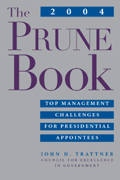
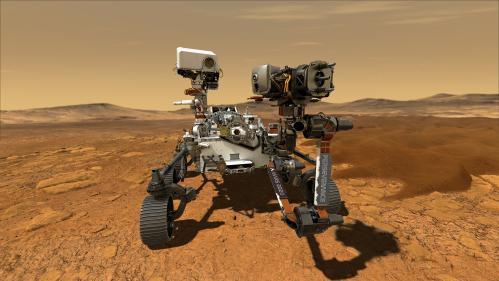
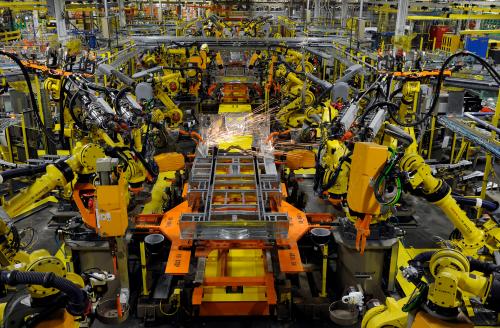
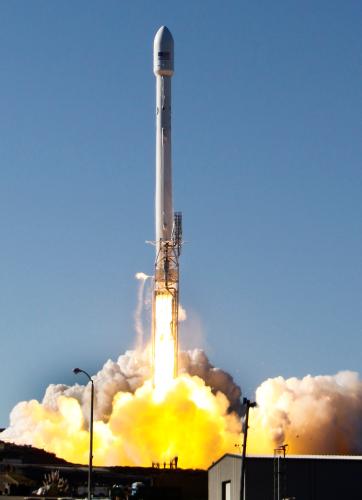


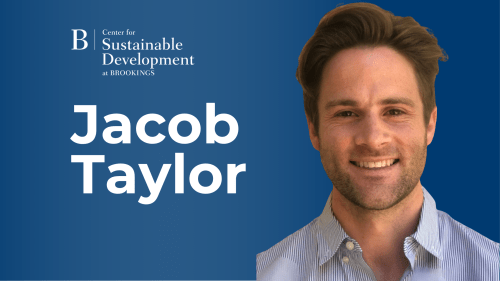

Commentary
Five megachanges that could transform the world
October 5, 2016